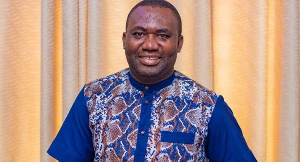 Stephen Appiah Takyi is the author
Stephen Appiah Takyi is the author
The development of every nation should be guided by a well-prepared development plan since the development process is not magical but rather a logical one. This implies that no leader can conjure development from the sky, but rather there is a need to put in place strategic policies, systems, and investments to develop a nation.
From a development planning perspective, the strategy used to develop a nation can be likened to the process individuals use to build their dream houses. In building your dream house, you adopt the generic process of land acquisition, site preparation, acquiring architectural and engineering drawings, developing the foundation, putting up the superstructure, roofing, furnishing, and then habitation.
Unfortunately, due to extreme and unproductive partisanship, we are building a nation without a plan and do not follow the logic in the development process. After elections, a political party will build the foundation, and another political party will succeed and either build the roof or start a foundation again.
This phenomenon is the primary reason why we will continue to seek support from the International Monetary Fund and other Bretton Woods institutions, a circumstance that has persisted since achieving political independence.
I, therefore, align myself with the argument by Dr. Abu Sakara that the solution to Ghana’s problem does not only depend on a change in government but rather on a change in governance.
As a development planner, whenever I am watching a tournament, I normally go beyond the pitch to learn more about the host country, the host cities, the participating countries, the spectators, the media, and all other issues that relate to development. Every development scholar will admit that there is nothing like a perfect system. However, there are better systems countries such as Ghana can learn from, and leadership must submit itself to learning from these best cases.
The aesthetics, efficiency, and exceptional organization of the UEFA EURO 2024 in cities such as Frankfurt, Berlin, Dortmund, Stuttgart, and Cologne are impossible to overlook. Do not forget that the city of Frankfurt has been developed to sustainably coexist with the River Main, which is described as the longest tributary of the Rhine. How many cities in Ghana have been able to urbanize without destroying their waterbodies?
Due to laxity in the enforcement of planning regulations, flooding has become an annual ritual and is a clear indication of system failure. We plan and manage cities to make them aesthetically pleasing, sustainable, and efficient, and it takes systems and strategic leadership to achieve these important urban design principles.
Based on the beautiful scenes from UEFA EURO 2024, I cannot help but continue to ask myself these questions: Are our leaders watching the tournament? Have they seen the quality of the stadia? Is Ghana still a football nation? Is it beyond Ghana to develop such a system?
Have they seen the condition of Stadia in Ghana? Why have we turned our pitches into auditoriums? Please note that a country that cannot maintain the pitches in its national stadiums will surely find it difficult to compete in the global development arena. It takes good leadership to get some of these basic things done!
The performances of players of Ghanaian descent in the tournament are a delight to watch. It is impressive to watch players such as Kobbie Mainoo, Nico Williams, Memphis Depay, Brian Brobbey, Jeremie Frimpong, Cody Gakpo, Kevin Danso, and Kwadwo Duah. It is important to celebrate these young brothers as they continue to make themselves and their families proud.
Their performance showcases the delightful talent of Ghanaian youth and underscores how this potential can be nurtured with supportive systems. However, it is also important for us to ask ourselves critical questions such as, "Would the potential of these young players be actualized if their parents had not travelled? Don’t we have young men with better talents walking on the streets of our cities, towns, and villages?
What systems are in place to nurture these talents? The lack of leadership and strategic policy has contributed to the wastage of the enormous talents of the Ghanaian youth. Leadership should lead the way in developing the requisite systems to develop the respective talents of our young people.
In our research paper on educational equity in Ghana, we argued that equity in Ghana’s educational system goes beyond affordability. We refer to Ghana’s current educational system as a certificate-based system, which does not favour talents in sports, entertainment, or the creative arts. In the research paper, we argue that there is a need for a shift from the certificate-based system to the talent-based educational system to actualize the potential of Ghanaian youth.
Anything aside from this will perpetuate the graduate unemployment problem we are faced with. This can be achieved by changing the curriculum to actualize these talents and by building modern sports secondary schools, creative arts secondary schools, vocational schools, and modern technical schools in all sixteen regions. The products of these institutions can be awarded a diploma, and they can start working with their certificates after graduation.
The purpose of education is to actualize the full potential of the citizenry. Any educational system that fails in this regard needs urgent restructuring. Therefore, if you see Nico Williams as the star of Spain, his potential was developed through the systems established by the leaders. Our young people should also shift from an overly partisan mentality and begin to demand policies, strategies, and interventions that will help develop their talents.